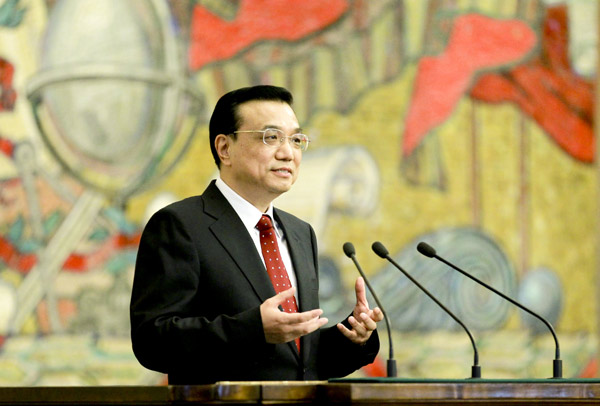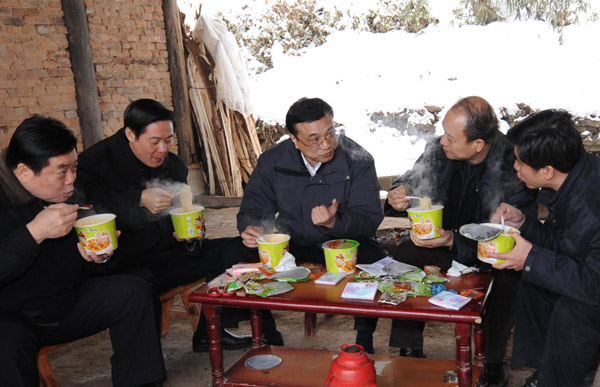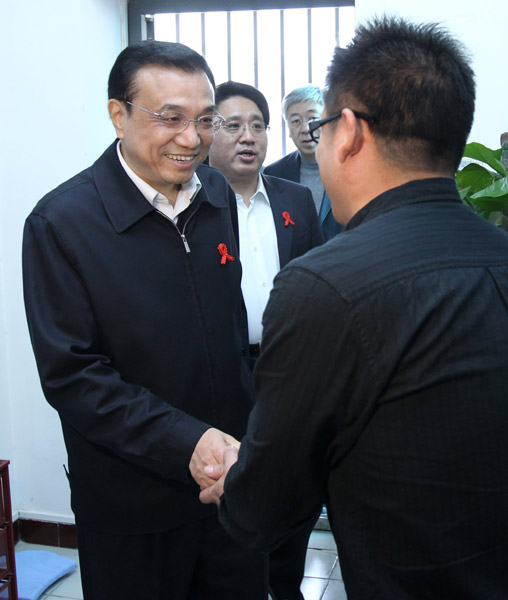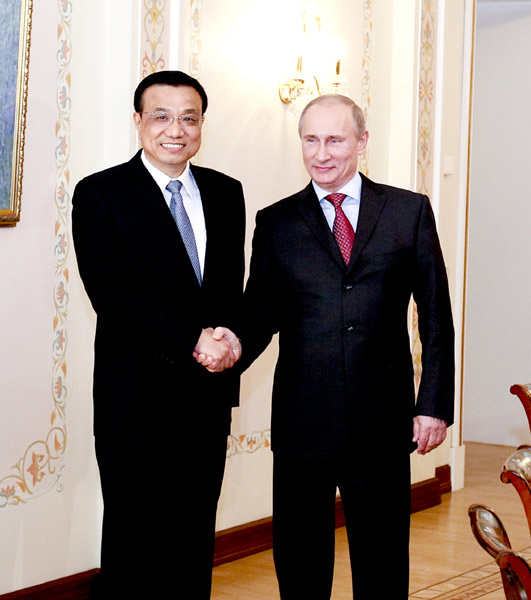
|
| File photo taken on April 28, 2012 shows Li Keqiang delivers a speech at Moscow State University in Moscow, capital of Russia. (Xinhua) |
新华社英文12月23日晚推出“中共高层新阵容”系列人物特稿。以下为介绍李克强同志的长篇特写:
BEIJING, Dec. 23 (Xinhua) -- His toughness in advancing complex reforms, as well as his social warmth and scholarly temperament have made him a major figure in China's political arena.
Calling reform "the biggest dividend for China," Vice Premier Li Keqiang has used different occasions to facilitate reforms since being re-elected in mid-November as a member of the Standing Committee of the Political Bureau of the Communist Party of China (CPC) Central Committee.
"Reform is like rowing upstream. Failing to advance means falling back," he said at a symposium on advancing comprehensive reforms.
"Those who refuse to reform may not make mistakes, but they will be blamed for not assuming their historical responsibility," he said.
China's new wave of reform has begun with curbing bureaucracy in meetings. When presiding over meetings, Li forbids officials to read prepared speeches, encourages them to take the floor freely and asks incisive and persistent questions to get to the bottom of matters.
In a meeting on China's HIV/AIDS prevention and treatment, he encouraged representatives from nongovernmental organizations to talk more about their problems, even though this delayed his appointment with other officials.
Li has also emphasized that only reform can improve Chinese people's living standards and that future reforms must ensure equal rights and opportunities for the people and ensure that everybody adheres to the rules.
From secretary of a village CPC branch to member of the CPC's highest leading body, Li, 57, has continuously maintained a down-to-earth work style and the principle of putting people first.
His curriculum vitae reflects his rich governance experience. Li served as secretary of the Communist Youth League of China (CYLC) committee of Peking University. He was a member of the Secretariat of the CYLC Central Committee and the Party chief of Henan and Liaoning provinces.
Confident, smart and eloquent in public, Li is frank, amiable, resolute and responsible at work, according to his acquaintances.
After 10 years of study at Peking University, Li earned a bachelor's degree in law and master's and doctorate degrees in economics. He has excelled in China's officialdom due to his academic accomplishments and international perspective.
Li first joined the highest leading body of the CPC five years ago at the first Plenary Session of the 17th CPC Central Committee. A few months later, he became China's youngest vice premier in nearly 20 years.

|
| File photo taken on Jan. 31, 2008 shows Li Keqiang eats instant noodles with his colleagues as they talk about disaster relief work in the snowstorm-stricken Ziyun Village of Laojun Township of Xuanhan County in southwest China's Sichuan Province. (Xinhua/Li Xueren) |
TENACIOUS REFORMER
Li has garnered much attention by tackling complex reforms over the past five years, during which time China has faced multiple challenges, including the deadly Wenchuan earthquake and the international financial crisis.
Macroeconomic adjustment was the first challenge the vice premier had to face in 2008.
When there was no agreement on a proper way to manage the repercussions of the international financial crisis, Li asked the State Council's fiscal and economic planning departments to adopt a proactive fiscal policy with the precondition of keeping the deficit below 3 percent.
The decision gave the Chinese economy a boost that was strong enough to avoid complications such as the sovereign debt crisis in Europe and the "fiscal cliff" in the United States.
Li also chaired more than 40 meetings to deliberate on and make arrangements for an affordable housing program for the needy, which is the biggest of its kind in China and has helped boost domestic consumption amid a slowing world economy.
Over the past few years, China's fiscal spending on affordable housing construction has reached a record high. With 17 million government-subsidized apartments already built, nearly 100 million Chinese have moved into comfortable, high-quality homes, and another 13 million apartments are currently under construction or being renovated.
Another reform that has thrust Li into a widening spotlight relates to medical and health care services, a worldwide challenge.
After Li took over as head of the State Council's leading group for medical and health care reform, the country quickly set a goal of turning medical and health care into a basic public service accessible to all, taking a progressive approach to prioritizing the basic needs of the people and the need for institutional improvement.
The central government has issued 14 documents to inspire local experiments since 2009. All relevant tasks are being implemented efficiently.
Under this regimen, the government has built the world's largest medical care system in more than three years, effectively easing public concern in this area.
U.S. scholar Robert Lawrence Kuhn said he considers this reform to be the greatest achievement China has scored in the past decade.
Margaret Chan, director-general of the World Health Organization, has called the achievement hard-won.
John Langenbrunner, the World Bank's chief health economist, described the results achieved by the reforms as unprecedented.
Li was also credited with seizing the opportunity presented by the 2008 financial crisis to propel complex fuel tax reforms involving multiple stakeholders.
The initiative has helped eliminate redundant fuel fees, inspired energy conservation and emission reduction, improved the refined oil pricing system and accumulated experience for future reforms.
This year, Li went to great lengths to tackle another bottleneck in tax reform. He conducted field surveys and led relevant departments to institute reform plans that replace turnover taxes with value-added taxes. After Shanghai spearheaded a pilot program, the tax burdens of the local service industry and small enterprises have been largely eased.
A prelude to the much-expected structural tax cut, the pilot program has now been expanded to nine provinces and municipalities as a significant institutional innovation for facilitating economic restructuring, boosting economic growth and improving people's living standards.
Li also led the formulation of China's 12th Five-Year Plan (2011-2015), which provides both overall guidance for the country's future development and specific guidance in nearly 100 areas.
Although Li was familiar with China's agricultural and industrial development as head of Henan and Liaoning provinces, he has gained a broader understanding of China's national circumstances after being put in charge of development and reform, fiscal affairs, urban-rural construction, environmental protection, land and resources and public health for the State Council.
He knows China's potential in economic and social development as well as the opportunities and challenges the country is facing.
To formulate a sound plan, Li conducted field surveys in a number of places and governmental departments, solicited opinions from lower-level officials, industrial experts and entrepreneurs and presided over symposiums to brainstorm plans concerning the tertiary and energy industries.
In-depth research was carried out for more than two years on significant issues, such as expanding domestic consumption in a sustainable manner, narrowing the urban-rural gap, designing an urbanization path and steadily improving people's living standards.
U.S. economist Michael Spence, a Nobel laureate, said the 12th Five-Year Plan is very complicated but clear. Its effective implementation will turn China into the most significant player in transforming economic growth patterns and rebalancing the world economy, he noted.
Joseph Stiglitz, also a Nobel laureate, said the development plan charts the direction of China's economic restructuring, with China's central task being to open up and better integrate with the outside world.
New responsibilities and opportunities will abound and the country will be more involved in reshaping the world economic order, he said.
Martin Feldstein, a professor of economics at Harvard University, noted the plan's important implications for the global economy. "Its key feature is to shift official policy from maximizing GDP growth toward raising consumption and average workers' standard of living," he noted.
Known as a tough troubleshooter, Li has regularly appeared where he has been needed most.
When food safety scares cropped up in 2010, Li was asked to head the State Council's food safety commission, orchestrating multisector cooperation.
"Food safety concerns every family and each person. Giving food safety offenders a knock-out blow is a must," Li stressed.
By including food safety in the performance assessment system for local governments, as well as cracking down on offenders, China has begun to see progress in curbing food safety scandals.
In early 2009, the world was caught off-guard by a new influenza A virus, with the World Health Organization issuing its highest influenza pandemic alert.
Not long after its outbreak in North America, the virus was transmitted to China, throwing the Chinese into a panic reminiscent of the Severe Acute Respiratory Syndrome (SARS) epidemic in 2003.
Li decisively implemented joint prevention by all relevant departments and urged the quick development of vaccines, which stopped the spread of the virus and minimized its impact on China.
This triumph has been lauded as an exemplary emergency response to a sudden public health incident.
As China's current reforms involve a more complicated problem of interests, analysts say knowledge and a broad horizon are as important in Chinese leaders as courage and resources.

|
| File photo taken on Nov. 18, 2011 shows Li Keqiang (L) shakes hands with an HIV carrier when he inspects AIDS prevention and treatment work in Beijing, capital of China. (Xinhua/Pang Xinglei) |
PEOPLE FIRST
Li's tenacity and decisiveness were shaped by his early days.
In March 1974, when China was being ravaged by the Cultural Revolution, 19-year-old Li was dispatched to Fengyang, a poverty-stricken county in east China's Anhui Province, to take up farming.
It was there he came to understand poverty and starvation.
He tilled the land during the day and read books at night. Admiring Li's spirit and his capacity to endure hardship, members of Dongling Brigade, Damiao Commune, chose him as Party chief.
"He was always the first to work, self-disciplined, down to earth and kind. As Party secretary, he never made people suffer, harmed no one and bullied no one," villagers recalled.
When the country resumed college entrance examination in 1977, Li took the exam and was accepted by the Law School of Peking University. Soon, he was elected chief of the university's Student Union. Upon graduation in 1982, he remained at Peking University to head its CYLC committee.
Three years later, the 30-year-old was chosen as a member of the Secretariat of the Central Committee of the CYLC, an organization of advanced young people under the leadership of the CPC.
While working with the CYLC Central Committee, Li devoted his spare time to studying the Chinese economy. His doctoral dissertation, "On the Tri-structure of China's Economy," won him the Sun Yefang Prize, the top honor for economic sciences on the Chinese mainland.
During his tenure at the CYLC Central Committee, he chose the site for the country's first primary school of Project Hope in Jinzhai County, east China's Anhui Province. Project Hope, co-launched by the CYLC Central Committee, is a charity dedicated to helping children in poverty-stricken areas access education.
He said he hoped the Hope School could bring hope to children in the CPC's revolutionary bases.
The move inspired other philanthropic actions, such as Youth Volunteers.
When Li left Beijing for Henan Province in June 1998, he set a record by becoming the country's youngest governor with a doctoral degree.
In seven years, Li avoided unnecessary social activities and devoted himself to solving problems concerning Henan's development. Given that the province had learned a bitter lesson from pomposity, Li instructed local officials to keep a low profile, say little and do much.
Breaking Henan's stereotypical image as an agricultural province, Li pursued industrialization, urbanization and agricultural modernization. In 2003, he formally proposed the concept of "the rise of the Central Plains" and put it into practice in Henan.
The Central Plains refer to regions comprising the middle and lower reaches of the Yellow River, including Henan, Hebei, Shandong and Shanxi provinces.
His proposal and practices became a prototype for the rise of central China, which is home to one-fourth of China's population and accounts for one-fifth of the country's economic output.
Apart from consolidating Henan's advantages as China's granary, Li facilitated the upgrade of local industries to extend the province's industrial chain. He also proposed the construction of an industrial corridor linking the provincial capital of Zhengzhou with the cities of Kaifeng and Luoyang, along which a number of pillar industries and conglomerates have been formed.
He urged local government officials to introduce capital, technology, experts, advanced management experience and mechanisms from eastern coastal provinces, which have been in the forefront of China's economic expansion, as well as strengthen cooperation with western provinces to seize bigger market share.
Using such tactics, Li figured out how to shift Henan from an agricultural province to an emerging industrial province.
Li also facilitated the province's urbanization by incubating city clusters in the Central Plains as new growth points.
He carried out an urbanization experiment through the development of the Zhengdong New District.
Instead of a sprawling area based on an old town relying on a single industry, the new district is an energy-efficient and livable place with finance, upscale commerce, logistics and tourism as its pillar industries.
For seven years, Henan maintained a growth rate 1.63 percentage points higher than the national average. The province climbed from 20th to 17th in national per capita GDP ranking, and its overall GDP ranked as the country's fifth largest and the first among western and central regions.
But more complicated challenges followed.
After more than 10 years of latency, HIV broke out in a number of places in Henan, aggravating the province's vulnerability to HIV/AIDS.
Li visited the worst-hit villages to see patients, surveying the difficulties they faced and staying on top of the situation. Gao Yaojie, a retired doctor and AIDS activist, was invited to his office to report on the situation.
When he served as Party chief of the province in 2002, Li immediately put HIV/AIDS prevention and treatment at the top of the agenda.
In Henan, he oversaw the country' s first provincial census on HIV/AIDS.
A total of 38 hard-hit villages received assistance directly from provincial governmental departments.
To ensure that HIV and AIDS patients could live decent lives, he instituted a policy that provided them shelter, food, clothing and basic medical insurance. Those who contracted the deadly disease from selling blood on the black market could receive free treatment, free physical exams and free services to control maternal-infant transmission of the virus. Orphans, as well as children of those with HIV/AIDS, could go to school free of charge.
By 2004, the HIV outbreak had been contained. Yin Yin Nwe, then representative of the United Nations Children's Fund for China, said Henan is a model both for China and the world and its experience is worth being popularized.
When Li was elevated to the central government, he was the chief of the State Council's AIDS prevention commission and made efforts to bring social forces into play.
He visited nongovernmental organizations to talk with volunteers and HIV/AIDS patients to encourage them to play a bigger a role in HIV/AIDS prevention.
In a congratulatory letter sent to Li on his re-election as member of the Standing Committee of the Political Bureau of the CPC Central Committee in November this year, UNAIDS Executive Director Michel Sidibe recognized the progress China has achieved in AIDS prevention and thanked Li for his leadership in this regard.
When Li was transferred to northeast China's Liaoning Province in 2004, he faced a different challenge.
There, Li was stunned to learn that nearly a thousand people in one town were sharing one toilet.
"The government will not hesitate to spend everything to help you move out of slums," Li vowed.
In March 2005, a renovation plan was released. Within three years, 1.2 million residents had moved into new apartments and the shantytowns had been relegated to history.
During the shantytown renovation, Li repeatedly emphasized the need to "put the people first," which later evolved into the essence of his governance philosophy.
Apart from housing upgrades, Li also explored ways to tap new growth points for the old industrial base.
He capitalized on the central government's Northeastern China Rejuvenation Plan and the national policy of further opening up the country's east coast to develop Liaoning's coastal areas. In this way, he worked to offset the province's disadvantages stemming from its reliance on heavy industrial manufacturing for growth.
In 2009, the province's coastal economic belt designed by Li became a national strategy and played a key role in the rejuvenation of the northeastern industrial base.

|
| File photo taken on April 27, 2012 shows Li Keqiang (L) shakes hands with Russian president-elect Vladimir Putin during their talks in Moscow, Russia. (Xinhua) |
SCHOLARLY TEMPERAMENT
Born in 1955 in east China's Anhui Province, Li spent his formative years studying sinology, or Chinese language and culture, from Li Cheng, a master of Chinese culture with the Anhui Provincial Research Institute of Cultural History.
This rare experience, combined with his later education at Peking University, turned him into a learned, eloquent person with a quick wit.
"I came here not only for knowledge, but also to cultivate my temperament and foster a learning style," Li once wrote in an essay to explain his love of Peking University.
In August 2011, he gave a speech in both Chinese and English at the University of Hong Kong, impressing participants with his scholarly temperament, discretion and friendliness.
The erudite leader has also shown enthusiasm and open-mindedness in foreign affairs. Early last year, he visited Spain, Germany and Britain, attending 46 activities in nine days.
He contributed signed articles to influential media in each host country to explain China's development and conducted in-depth exchanges with foreign statesmen to facilitate Sino-European cooperation.
In October 2011, Li led a delegation to the Democratic People's Republic of Korea and the Republic of Korea to ease tensions on the Korean Peninsula.
It was the first time a Chinese leader had visited the two countries back-to-back, as well as a significant diplomatic maneuver taken by China to facilitate peace in northeast Asia.
During his April trip to Europe, which included stops in Russia, Hungary, Belgium and the EU headquarters in Brussels, Li gave speeches, attended economic activities and conducted exchanges with foreign statesmen.
At the first EU-China Urbanization Partnership High-Level Conference, Li and President of the European Commission Jose Manuel Barroso signed a joint declaration to cement cooperation on sustainable urban development.
During his meeting with then Russian President-elect and Prime Minister Vladimir Putin, Li proposed a mutually beneficial solution emphasizing upstream and downstream integration, which injected new momentum into China-Russia oil and gas cooperation.
All these activities offer a glimpse into his foresight and capability in coping with foreign affairs.
Li Keqiang reads English works in his spare time and monitors the latest economic and technical developments around the world.
A few years ago, he instructed think tanks of the State Council to study the concepts of the "middle-income trap" and "inclusive growth" as proposed by the World Bank and the Asia Development Bank.
"The Third Industrial Revolution" authored by Jeremy Rifkin, president of the Foundation on Economic Trends, also caught Li's attention. He has asked the National Development and Reform Commission and the Development Research Center of the State Council to pay close attention to this research and made his latest instruction early November this year.
After a leading overseas science magazine published research predicting that combustible ice in the sea could become a revolutionary substitute energy source, Li instructed the Ministry of Land and Resources to follow relevant studies.
Li loves books and has a good memory. Through divergent thinking, he can link the research of many frontier issues with classical Chinese works, according to sources close to him.
He also prefers to make impromptu speeches, talk face-to-face, ask in-depth questions, find the nature of problems and develop solutions on the spot if possible.
Reading has not only broadened Li's horizons but has also cultivated his character. He always lives an honorable life and never allows his family or staff to seek personal gain using his name, said one of his colleagues.
Chen Hong, Li's wife, is an English professor at the foreign language department of Capital University of Economics and Business. The couple have one daughter.